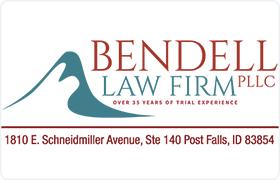Tensed Criminal Lawyer, Idaho
Sponsored Law Firm
-
 x
x

Click For More Info:
-
The Bendell Law Firm, PLLC
1810 E Schneidmiller Ave, Suite 140, Post Falls, ID 83854» view mapCriminal Defense, Accident & Injury Law You Don’t Pay If We Don’t Win
With deep experience and a multi-faceted perspective and understanding of Idaho and Washington law, we can help you achieve the best results in a variety of practice areas.
208-981-0555
James Bendell
✓ VERIFIED *Status is reviewed annually. For latest information visit hereAccident & Injury, Personal Injury, Criminal, DUI-DWI
Former Prosecutor, Superior Court Commissioner and Judge Pro Team
Bendell Law Firm’s attorney James Bendell focuses primarily on personal injury, civil litigation, and criminal defense, and is also extensive experi... (more)
John H. George
Child Support, Criminal, Constitutional Law, Administrative Law
Status: In Good Standing *Status is reviewed annually. For latest information visit here
FREE CONSULTATION
CONTACTPaul Evan Christensen
Criminal, Indians & Native Populations, Civil Rights, Civil & Human Rights
Status: In Good Standing *Status is reviewed annually. For latest information visit here Licensed: 31 Years
John F. Porter
Bankruptcy, Criminal, Divorce & Family Law, Wills & Probate
Status: In Good Standing *Status is reviewed annually. For latest information visit here
FREE CONSULTATION
CONTACTJames Edward Siebe
Traffic, White Collar Crime, Felony, DUI-DWI, Criminal
Status: In Good Standing *Status is reviewed annually. For latest information visit here Licensed: 47 Years
Mark S. Moorer
Land Use & Zoning, Federal, Family Law, Criminal
James Bendell
Personal Injury, Criminal
Status: In Good Standing *Status is reviewed annually. For latest information visit here
Staci Lynn Anderson
Child Custody, Criminal, Civil Rights
Status: In Good Standing *Status is reviewed annually. For latest information visit here
Megan Marshall
Litigation, Employee Rights, Divorce, Criminal
Status: In Good Standing *Status is reviewed annually. For latest information visit here
Dan Sheckler
Civil Rights, Family Law, Criminal, Personal Injury
Status: In Good Standing *Status is reviewed annually. For latest information visit here
 James Bendell Post Falls, ID
James Bendell Post Falls, ID Practice AreasExpertise
Practice AreasExpertise
